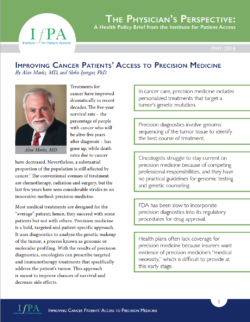Improving Cancer Patients’ Access to Precision Medicine
May 1, 2016
 Treatments for cancer have improved dramatically in recent decades. The five-year survival rate – the percentage of people with cancer who will be alive five years after diagnosis – has gone up, while death rates due to cancer have decreased. Nevertheless, a substantial proportion of the population is still affected by cancer. The conventional avenues of treatment are chemotherapy, radiation and surgery, but the last few years have seen considerable strides in an innovative method: precision medicine.
Treatments for cancer have improved dramatically in recent decades. The five-year survival rate – the percentage of people with cancer who will be alive five years after diagnosis – has gone up, while death rates due to cancer have decreased. Nevertheless, a substantial proportion of the population is still affected by cancer. The conventional avenues of treatment are chemotherapy, radiation and surgery, but the last few years have seen considerable strides in an innovative method: precision medicine.
Most medical treatments are designed for the “average” patient; hence, they succeed with some patients but not with others. Precision medicine is a bold, targeted and patient-specific approach. It uses diagnostics to analyze the genetic makeup of the tumor, a process known as genomic or molecular profiling. With the results of precision diagnostics, oncologists can prescribe targeted and immunotherapy treatments that specifically address the patient’s tumor. This approach is meant to improve chances of survival and decrease side effects.
Tags: Cost Sharing, Innovation, Oncology, Regulatory IssuesCategorized in: Policy Briefs, Policy Papers

